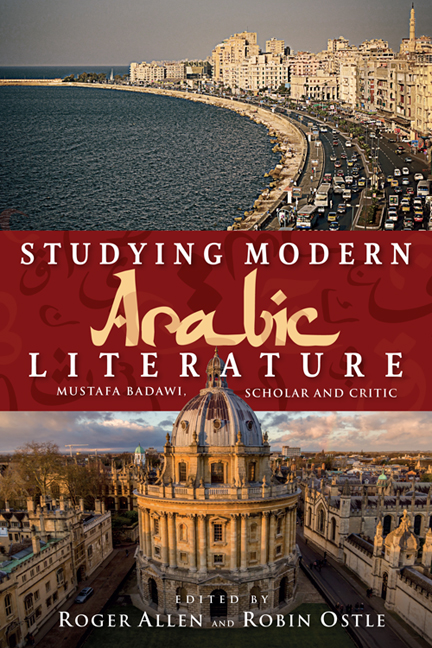Book contents
- Frontmatter
- Contents
- List of Figures
- Introduction
- Part I Alexandria to Oxford
- Part II The Academic Legacy
- 5 Beginning and End: Exploring the Qur'anic ‘Grand Story’
- 6 Modern Arabic Literature as Seen in the Late Nineteenth Century: Jurji Murqus's Contribution to Korsh and Kirpichnikov's Vseobshchaya Istoria Literatury
- 7 The ‘Second Journey’ (Al-Rihla al-thaniya) of Muhammad al-Muwaylihi's Hadith 'Isa Ibn Hisham Revisited
- 8 Ataturk Becomes 'Antar: Nationalist-vernacular Politics and Epic Heroism in 1920s Egypt
- 9 Jewish Arabs in the Israeli Asylum: A Literary Reflection
- 10 Strange Incidents from History: Youssef Rakha and his Sultan's Seal
- 11 Towards a Comparative Approach to Arabic Literature
- 12 Does Literature Matter? The Relationship between Literature and Politics in Revolutionary Egypt
- Notes on the Contributors
- Index
8 - Ataturk Becomes 'Antar: Nationalist-vernacular Politics and Epic Heroism in 1920s Egypt
from Part II - The Academic Legacy
Published online by Cambridge University Press: 05 August 2016
- Frontmatter
- Contents
- List of Figures
- Introduction
- Part I Alexandria to Oxford
- Part II The Academic Legacy
- 5 Beginning and End: Exploring the Qur'anic ‘Grand Story’
- 6 Modern Arabic Literature as Seen in the Late Nineteenth Century: Jurji Murqus's Contribution to Korsh and Kirpichnikov's Vseobshchaya Istoria Literatury
- 7 The ‘Second Journey’ (Al-Rihla al-thaniya) of Muhammad al-Muwaylihi's Hadith 'Isa Ibn Hisham Revisited
- 8 Ataturk Becomes 'Antar: Nationalist-vernacular Politics and Epic Heroism in 1920s Egypt
- 9 Jewish Arabs in the Israeli Asylum: A Literary Reflection
- 10 Strange Incidents from History: Youssef Rakha and his Sultan's Seal
- 11 Towards a Comparative Approach to Arabic Literature
- 12 Does Literature Matter? The Relationship between Literature and Politics in Revolutionary Egypt
- Notes on the Contributors
- Index
Summary
From the 1890s, published colloquial Arabic poetry emerged as populist political commentary in Egypt when several factors converged: nationalist anti-imperialist activism crystallised, a non-official press was in place, and some outstanding poets became fierce public commentators and exploited the widening opportunities for print-led circulation. Disseminated through a popular press that included organs dedicated to vernacular expression – then read aloud, memorised and thus circulated orally – their poetry offered alternative political voices that converged on or diverged ambiguously from the varying public political stances of Egypt's nationalist elite. This elite was internally heterogeneous according to origins and professions, comprising a rising bourgeoisie and landowning class (including a secularly educated cluster of reformer-intellectuals), and scholar-bureaucrats trained in traditional Islamic sciences, some of whom composed colloquial poetry.
Mahmud Bayram al-Tunisi (1893–1961) was not a member of any elite. An autodidact reared in the Maghribi fishermen's neighbourhood of al-Sayyala, Alexandria, he became a leading practitioner of vernacular poeticpolitical art, gaining renown during the political turmoil following the First World War and the rising nationalist pressures on Britain's ‘Protectorate’ over Egypt. Banished in 1919 after writing poetry attacking Egypt's royals, Bayram's voice remained vibrant locally. He wrote for popular periodicals from exile in France and Tunisia, sending in dialect poetry, essays, maqamat mockeries, short stories, memoirs and satiric pastiches of the high poetic and belletristic traditions demonstrating how well read this unschooled young man was. Bayram's transformative exploitation of forms – both ‘folk’ and ‘learned’ – was not simply an adoption of appropriate generic vehicles. His was a motivated critical appropriation of forms wherein the genre templates themselves – representative of cultural categories and expressive histories – constituted targets as well as vehicles of satire. While ‘the political’ in Bayram's corpus incorporates representation of topical public politics, more profoundly his news commentary critiqued cultural categories that buttressed social hierarchies undergirding political authority of the few over the many. Thus he satirically reworked genres associated with ‘high’ culture but appropriated forms from oral expressive culture, drawing on their structures, imagery, stock characters and epithetic usages to celebrate community-affirming aspects of heritage whilst interrogating received identities through satire.
- Type
- Chapter
- Information
- Studying Modern Arabic LiteratureMustafa Badawi, Scholar and Critic, pp. 118 - 138Publisher: Edinburgh University PressPrint publication year: 2015



